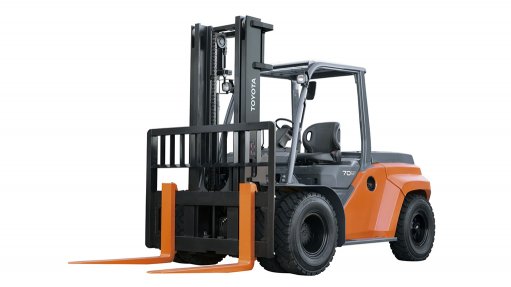
New-unit sales in the South African industrial equipment market will decline by an estimated 30% this year, says EIE Group operations director Chantell Malherbe.
Most of this drop will come from the more established brands, with an uptick seen in the sale of less expensive Chinese products, at roughly 30% to 35% below the price of competing products from other countries.
China also quickly cycled through the Covid-19 pandemic, returning to production as other global markets were forced to close down.
EIE Group also sells Chinese products, but around 90% of its revenue comes from the sale, rental and value add of Toyota forklifts.
Malherbe says although Covid-19 has wreaked havoc in the domestic industrial equipment market, the industry has proved quite resilient in the face of the Covid-19 pandemic.
A big part of this springs from the fact that a large number of the industry’s clients were labelled as essential services, such as retailers and fast-moving consumer goods providers, which meant that they were allowed to keep their doors open during the various national shutdown levels.
“Some big tenders are being launched again and for us that is very encouraging,” notes Malherbe.
This said, however, customers are currently “very much price conscious”, she adds.
“In order for their operations to continue, businesses will buy a truck that will last a limited amount of time. As their revenue starts picking up and their business normalises, we expect them to return to the more premium brands.”
The decline of the rand against major currencies has also hurt the local industrial equipment market.
“Luckily EIE Group had quite a bit of stock before Covid hit, so we were able to clear this at the old exchange rate,” says Malherbe.
“The margins on new-unit sales are so tight there is no room to drop the price. This means there is also a push to the rental and pre-owned markets.”
EIE Group was aiming for a market balance of 50% owned and 50% rental this year, but Covid-19 has put a stop to these plans.
“Some customers are still purchasing, but rental demand is high,” notes Malherbe.
“Customers currently also want shorter rental terms, and that is where we now work to be flexible. They want to commit to a shorter 36-month contract, rather than a standard 60-month contract.”
Rebuilds are also proving popular.
“We have increased our rebuild bays,” says Malherbe. “With a gold rebuild we change all the bells and whistles and we guarantee another three years on the truck, pending the application. These trucks typically come out of a long-term rental contract and we then rebuild them to enter another contract including maintenance.
“A rebuild will be 40% cheaper than a new machine.”
Malherbe adds that in the right application and with the periodic maintenance taking place a Toyota internal combustion (IC) forklift, running on gas or diesel, can have a lifespan of up to nine years.
Electric forklifts have a shorter lifespan mainly due to the battery life. Currently powered by ironclad batteries, there is a strong move towards lithium-ion batteries, which could see the electric forklift lifespan match that of an IC forklift.
The EIE Group’s sales and rental fleet is currently at around 75% IC and 25% electric.
“The country is still adapting to the electric trend,” says Malherbe.
Looking ahead, EIE Group says it cannot commit to any long-term outlook for the market.
“We look at our budget every quarter,” says Malherbe. “We are tracking 80% to 85% of our normalised revenue at the moment, and we believe this will remain the case for the rest of the financial year.”
EIE Group services South Africa, Lesotho and Swaziland, as well as 11 countries north of the border.
The group is looking at adding another business to its fold, and hopes to finalise this acquisition in November.